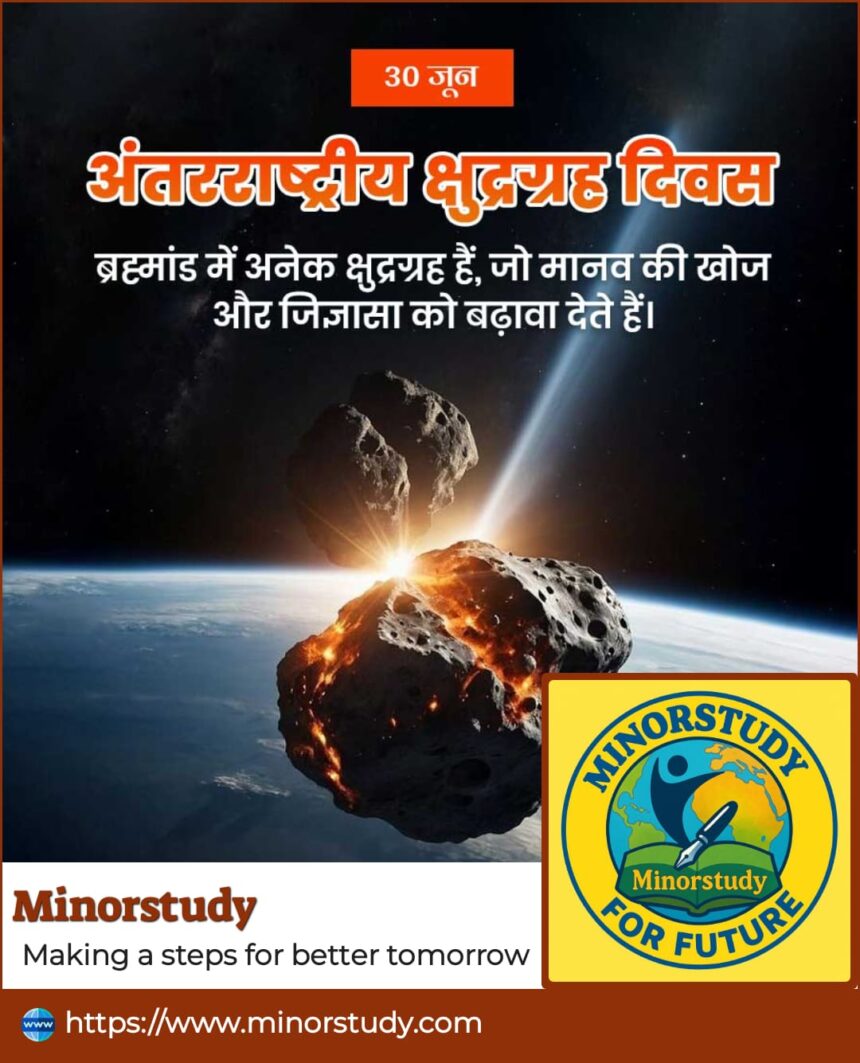☄️ 7 Shocking Reasons Why International Asteroid Day Could Save Humanity
Introduction: When Space Rocks Become Earth’s Concern
International Asteroid Day: Asteroids—those mysterious chunks of rock floating in space—might seem irrelevant to your daily life. But on International Asteroid Day, celebrated every year on 30th June, the world comes together to reflect on something profoundly real and urgent: planetary defense.
- Introduction: When Space Rocks Become Earth’s Concern
- 🌌 History of International Asteroid Day
- 🧠 Astounding Facts About Asteroids
- 📅 Timeline of Asteroid Awareness and Defense
- 🎯 Significance of International Asteroid Day
- 1. 🔭 Awareness
- 2. 🛡️ Planetary Defense
- 3. 🧠 Scientific Curiosity
- 4. 🌍 Global Collaboration
- 5. 🧬 Origins of Life
- 🙌 Observance: How the World Celebrates Asteroid Day
- 💫 Wishing Messages for International Asteroid Day
- 💬 FAQs About International Asteroid Day
- 📌 Q1: Why was June 30 chosen?
- 📌 Q2: Is Earth really at risk?
- 📌 Q3: What is NASA doing about it?
- 📌 Q4: Can asteroids be deflected?
- 📌 Q5: How can I get involved?
- 📌 Important Points to Remember
- 🧍 Why It’s Important in Our Lives
- 🪐 Impact on Society
- 🌟 Conclusion: Looking Up, Thinking Ahead
- 📢 Call to Action:
International Asteroid Day isn’t just a science celebration; it’s a global wake-up call. It reminds us that planet Earth is not immune to cosmic threats, and that science, awareness, and preparation are our best shields against the kind of event that wiped out the dinosaurs 66 million years ago.
Whether you’re an astronomer, a student, or someone who just stares at the stars in awe, this day touches you. It bridges science and survival, wonder and warning.
🌌 History of International Asteroid Day
International Asteroid Day was officially declared by the United Nations in December 2016 through UN General Assembly resolution A/RES/71/90, following a proposal made by the Association of Space Explorers.
The date—30 June—was chosen to commemorate the Tunguska event that occurred in 1908, the most significant asteroid-related impact event in recorded history.
Timeline Highlights:
1908: Tunguska event flattens 2,000 square kilometers of forest in Siberia.
2014: Physicist Stephen Hawking and astronaut Rusty Schweickart promote global awareness about asteroid threats.
2015: The first Asteroid Day is observed.
2016: UN officially designates 30th June as International Asteroid Day.
2025: Global science communities participate in collaborative planetary defense events.
🧠 Astounding Facts About Asteroids
☄️ Asteroids are leftover building blocks of the solar system, over 4.6 billion years old.
🌍 Scientists estimate over 1 million asteroids in our solar system.
🚀 NASA and ESA track more than 30,000 near-Earth objects (NEOs).
🛡️ NASA’s DART mission (2022) successfully altered the path of an asteroid for the first time in human history.
💥 An asteroid the size of a bus can cause massive regional destruction.
🧬 Some asteroids contain organic molecules—the ingredients of life.
🧲 The Chicxulub asteroid, 10 km wide, is believed to have ended the age of dinosaurs.
📅 Timeline of Asteroid Awareness and Defense
| Year | Milestone |
|---|---|
| 1908 | Tunguska Event—the most powerful impact in modern history. |
| 1980s | Asteroid Impact Theory gains acceptance among scientists. |
| 2005 | NASA begins Near-Earth Object Observations Program. |
| 2014 | Asteroid Day campaign launched. |
| 2016 | UN officially proclaims International Asteroid Day. |
| 2022 | NASA’s DART successfully impacts asteroid Dimorphos. |
| 2025 | Growing participation from schools, observatories, and space agencies worldwide. |
🎯 Significance of International Asteroid Day
Why should a normal person care about space rocks?
Because this is not a sci-fi story—it’s a real and preventable risk. International Asteroid Day serves several crucial purposes:
1. 🔭 Awareness
Educates the public about Near-Earth Objects (NEOs) and potential collision threats.
2. 🛡️ Planetary Defense
Promotes investment in tracking and deflection technologies to protect Earth.
3. 🧠 Scientific Curiosity
Inspires young minds to pursue careers in space science, physics, and astronomy.
4. 🌍 Global Collaboration
Encourages countries to share data and resources, because asteroid impacts don’t recognize borders.
5. 🧬 Origins of Life
Raises interest in asteroids as messengers from the early solar system, possibly carrying clues about life itself.
🙌 Observance: How the World Celebrates Asteroid Day
From schoolchildren to scientists, people observe this day through a range of activities:
📡 Live Space Talks hosted by ESA, NASA, ISRO, and others.
🧪 Planetary defense simulations and open data discussions.
🌌 Telescope viewing events at observatories and planetariums.
📚 Educational workshops and webinars on asteroid science.
📱 Social media campaigns using hashtags like #AsteroidDay, #PlanetaryDefense.
💫 Wishing Messages for International Asteroid Day
Looking to post or send thoughtful wishes on June 30th? Here are a few:
“Happy International Asteroid Day! May science always light the path to safety and discovery.”
“Here’s to defending Earth—one asteroid at a time!”
“Asteroids: The universe’s ancient storytellers and sudden surprises. Stay curious and cautious!”
💬 FAQs About International Asteroid Day
📌 Q1: Why was June 30 chosen?
To commemorate the Tunguska asteroid explosion in 1908, which leveled a vast forest in Siberia.
📌 Q2: Is Earth really at risk?
Yes, although large impacts are rare, even small ones can cause massive damage. That’s why tracking and preparedness are essential.
📌 Q3: What is NASA doing about it?
NASA has several programs, including NEOWISE, Sentry System, and the Planetary Defense Coordination Office, aimed at detecting and mitigating threats.
📌 Q4: Can asteroids be deflected?
Yes. In 2022, NASA’s DART mission successfully nudged an asteroid off its path—a huge breakthrough.
📌 Q5: How can I get involved?
Join webinars, support science education, follow updates from your local observatory, and spread awareness on social platforms.
📌 Important Points to Remember
Asteroids are ancient but not irrelevant.
Awareness is the first step toward prevention.
Science has already begun testing real solutions.
Your curiosity could lead to a future in space science or planetary defense.
This day is not about fear—it’s about readiness and wonder.
🧍 Why It’s Important in Our Lives
Though it may seem distant, the impact of an asteroid event could change your life overnight. Consider:
In Daily Life:
🌐 Investments in space science lead to innovations in materials, communications, and AI.
📱 Your smartphone GPS benefits from space-based research born from planetary defense efforts.
👩🚀 Young students inspired today may become tomorrow’s space heroes.
🧠 The push for asteroid tracking builds a culture of global preparedness—relevant for everything from pandemics to climate change.
🪐 Impact on Society
Positive Impacts:
🚀 Boosts STEM education and careers.
🌍 Encourages international scientific collaboration.
🔐 Sparks critical thinking and problem-solving in youth.
💼 Supports aerospace industry, creating jobs and research opportunities.
Negative Realities (If Ignored):
🔥 Devastating regional impacts.
🧬 Environmental damage, potential loss of life.
📉 Global economic shock.
But with preparation, technology, and cooperation—these can be avoided.
🌟 Conclusion: Looking Up, Thinking Ahead
International Asteroid Day is not just about space—it’s about survival, science, and shared responsibility. It’s a day to look at the sky not with fear, but with informed curiosity.
By dedicating just one day a year to learning and preparing, we contribute to something much bigger: the safety and continuity of life on Earth.
🚀 Final Thought:
“The dinosaurs didn’t have a space program. We do. Let’s use it.” — Neil deGrasse Tyson
📢 Call to Action:
On this 30th June, take a moment to:
Learn about asteroid threats.
Teach your children.
Attend a webinar.
Follow #AsteroidDay.
Support space research.
Because you don’t need to be a scientist to protect the planet. You just need to care.









Решили купить Honda? проверьте свой автомобиль широкий ассортимент автомобилей Honda, включая новые модели, такие как Honda CR-V и Honda Pilot, а также автомобили с пробегом. Предоставляем услуги лизинга и кредитования, а также предлагает различные акции и спецпредложения для корпоративных клиентов.